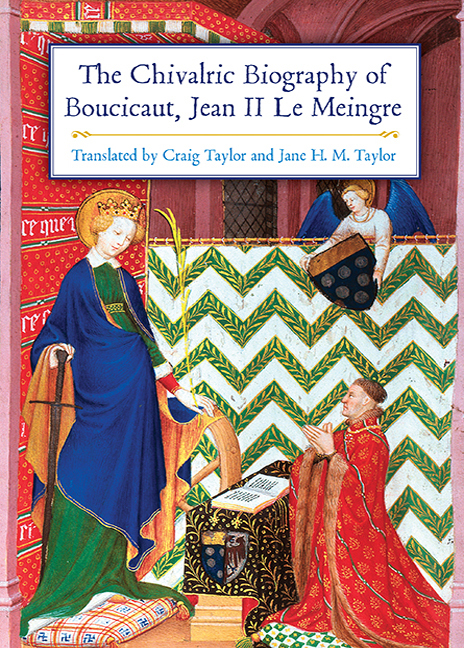Introduction
Published online by Cambridge University Press: 29 July 2017
Summary
The Book of the Deeds of My Good Lord Jean Le Meingre, Known as Boucicaut is a chivalric biography celebrating the life of one of the most prominent knights of the Middle Ages. This anonymous work was completed on 9 April 1409, thirteen years before the death of its subject, Jean II Le Meingre, known by the sobriquet Boucicaut (1366–1421). It survives in just one manuscript, BNF fr. 11432, a fine, large folio volume of 125 parchment leaves. It is written throughout in two columns, by the same neat early fifteenth-century hand. It is a handsome, expensively produced volume: initial letters have been decorated in gold, red, and blue, and the copyist has left space for eight miniatures, although these, unfortunately, were never completed. Might this have been the author's own presentation manuscript? There are in any case no other surviving manuscripts.
The biography presented Boucicaut as a flower of chivalry and the embodiment of the highest qualities expected of a knight. It recounted his life and career up until 6 March 1409, when he was still serving as governor of Genoa on behalf of the French king Charles VI (1380–1422), and when his reputation, in France, was still high.
The first part of The Book of the Deeds narrated the origins of Boucicaut's career and his swift rise to prominence. He had followed in the footsteps of his father Jean I Le Meingre, also known as Boucicaut (d.1367), who had enjoyed a successful career as a soldier and diplomat, culminating in his appointment as one of the two marshals of France in 1356. As a young man, Jean II Le Meingre served in the company of Louis de Bourbon and Louis de Sancerre, fighting against both the English and rebels like Charles de Navarre and Philip van Artevelde. The younger Boucicaut was knighted at the age of sixteen on the eve of the battle of Roosebeke (27 November 2 introduction 1382), where Artevelde was killed and his Flemish army defeated (I, chapter 10). Boucicaut later took part in Louis de Bourbon's expedition to Castile in 1386 to fight against John of Gaunt and the English (I, chapter 15). In 1391, Charles VI appointed Boucicaut, aged just twenty-six, to replace Jean IV de Mauquenchy as marshal of France (I, chapter 19).
- Type
- Chapter
- Information
- Publisher: Boydell & BrewerPrint publication year: 2016



